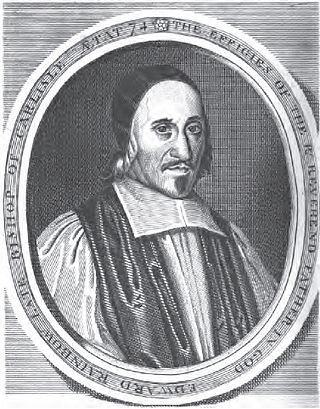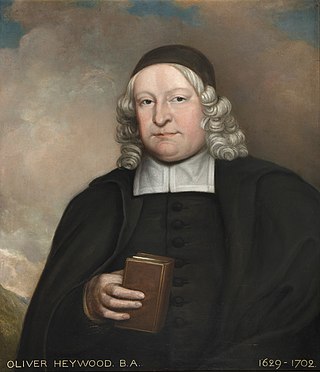Life
He was a native of Cambridge, where he graduated B.A. from St Catharine's Hall early in 1647. He became a fellow of Christ's College in 1649, and proceeded M.A. in 1650. [1] He belonged to the Cambridge Platonist school; among his friends at Christ's were Sir John Finch and Henry More. He was also close to Joseph Glanvill. [2]
Rust gave up his fellowship in 1659. Soon after the Restoration of 1660, he was invited to Ireland by Jeremy Taylor, ordained deacon and priest on 7 May 1661, and made dean of Connor in August. In 1662 he was presented by the crown to the rectory of Island Magee. [2]
On 20 October 1663, preaching at Newtownards at the funeral of Hugh Montgomery, 1st Earl of Mount Alexander, Rust remarked, "New presbyter is but old priest writ large"; John Milton's sonnet containing the same line was not published till 1673. In 1664 he was rector of Lisburn, where Edward Conway, 1st Earl of Conway lived. In 1665 he visited Conway in England, when Valentine Greatrakes was trying to cure Lady Conway's headaches. [2]
Jeremy Taylor died at Lisburn on 13 August 1667, and Rust preached a well-known funeral sermon. In succession to Taylor, Rust was appointed bishop of Dromore by patent in November 1667, and consecrated in Christ Church, Dublin, on 15 December. He died of fever in the prime of life in December 1670, and was buried in the choir of Dromore Cathedral in the same vault with his friend Taylor. [2]
Works
In 1655 Rust delivered a Latin discourse in Great St. Mary's, Cambridge, in answer to Pontius Pilate's question "What is Truth?" At the commencement of 1658 he maintained in the same place the thesis that scripture teaches the resurrection of the body, and that reason does not refute it. Rust said he had studied all creeds, and preferred the Church of England. His works are: [2]
- A Letter of Resolution concerning Origen, London, 1661. This work defends the doctrine of pre-existence of Origen, and was censured by Theophilus Dillingham. [3] It also touched on apocatastasis. [4]
- Sermon on ii. Tim. i. 10, preached at Newtown, 20 Oct. 1663, at the Funeral of Hugh, earl of Mount Alexander, Dublin, 1664.
- Sermon at Jeremy Taylor's Funeral, Dublin, 1667; many later editions. It was included by Reginald Heber in vol. i. of Taylor's Works.
- A Discourse of Truth, London, 1677; another edition, with notes and a preface by Joseph Glanvill, was published by James Collins, London, 1682. This is not identical with Rust's discourse delivered at Cambridge in 1655.
- A Discourse of the Use of Reason in Matters of Religion, showing that Christianity contains nothing repugnant to Right Reason, against Enthusiasts and Deists, London, 1683; the Latin original edited by Henry Hallywell, with a translation, notes, and a dedication to Henry More.
- Remains, edited by Henry Hallywell and dedicated to his diocesan John Lake, London, 1686.
Glanvill said that Rust gave a new turn to Cambridge studies, going back to "primitive learning and theology". [2] Hallywell wrote that he was familiar with Kabbalah. [5]

Jeremy Taylor (1613–1667) was a cleric in the Church of England who achieved fame as an author during the Protectorate of Oliver Cromwell. He is sometimes known as the "Shakespeare of Divines" for his poetic style of expression, and he is frequently cited as one of the greatest prose writers in the English language.

Joseph Glanvill was an English writer, philosopher, and clergyman. Not himself a scientist, he has been called "the most skillful apologist of the virtuosi", or in other words the leading propagandist for the approach of the English natural philosophers of the later 17th century. In 1661 he predicted "To converse at the distance of the Indes by means of sympathetic conveyances may be as natural to future times as to us is a literary correspondence."

Henry More was an English philosopher of the Cambridge Platonist school.

Robert South was an English churchman who was known for his combative preaching and his Latin poetry.

Edward Rainbowe or Rainbow (1608–1684) was an English academic, Church of England clergyman and a noted preacher. He was Master of Magdalene College, Cambridge, Vice-Chancellor of the University of Cambridge and Bishop of Carlisle.

The Cambridge Platonists were an influential group of Platonist philosophers and Christian theologians at the University of Cambridge that existed during the 17th century. The leading figures were Ralph Cudworth and Henry More.
William Fuller (1608–1675) was an English churchman.

William Croone was an English physician and one of the original Fellows of the Royal Society.

Peter Sterry was an English independent theologian, associated with the Cambridge Platonists prominent during the English Civil War era. He was chaplain to Parliamentarian general Robert Greville, 2nd Baron Brooke and then Oliver Cromwell, a member of the Westminster Assembly, and a leading radical Puritan preacher attached to the English Council of State. He was made fun of in Hudibras.
William Moreton was an English prelate in the Church of Ireland who served as the Bishop of Meath from 1705-1716.

The Diocese of Down and Dromore is a diocese of the Church of Ireland in the south east of Northern Ireland. It is in the ecclesiastical province of Armagh. The geographical remit of the diocese covers half of the City of Belfast to the east of the River Lagan and the part of County Armagh east of the River Bann and all of County Down.

Oliver Heywood (1630–1702) was a British nonconformist minister, ejected for his beliefs.
Nicholas Bernard was an Anglican priest and author during the 17th century. A dean in Ireland at the time of the Rebellion of 1641, he wrote descriptions of current events. He was also the biographer of James Ussher.
James Margetson was an English churchman, Church of Ireland Archbishop of Armagh from 1663 till 1678.
Henry Leslie was a Scotsman who became the Church of Ireland Bishop of Down and Connor from 1635 to 1661 and briefly Bishop of Meath from January to April 1661.
Richard Perrinchief or Perrincheif was an English royalist churchman, a biographer of Charles I, writer against religious tolerance, and archdeacon of Huntingdon.
John Reading (1588–1667) was an English priest of Calvinist views and Biblical commentator.

The Dean of Connor is based at Christ Church Cathedral, Lisburn in the Diocese of Connor within the Church of Ireland. The chapter is however known as the Chapter of St Saviours, Connor after the previous cathedral church in Connor.

Sir George Rawdon, 1st Baronet (1604–1684), of Moira, County Down which he founded, was an English army officer and politician.
Richard Steele was a nonconformist theologian.
This page is based on this
Wikipedia article Text is available under the
CC BY-SA 4.0 license; additional terms may apply.
Images, videos and audio are available under their respective licenses.
 This article incorporates text from a publication now in the public domain : Lee, Sidney, ed. (1897). "Rust, George". Dictionary of National Biography . Vol. 50. London: Smith, Elder & Co.
This article incorporates text from a publication now in the public domain : Lee, Sidney, ed. (1897). "Rust, George". Dictionary of National Biography . Vol. 50. London: Smith, Elder & Co.









